Green
post-course delivery support
Peep practitioners cover a lot during our 2-day Learning Together Programme training, but it’s invaluable to have opportunities to share questions and practical tips with other Peep practitioners, when you’re doing Peep in ‘real life’, after the training.
Here are 5 types of Peep delivery support included in the training price – more info about them all in our log-in Members Area or contact us, and we look forward to seeing or hearing from you soon!
1 Website - with log-in areas for practitioners
As well as providing access to the whole programme (74 child development topics, session plans, parent handouts, etc), our log-in areas contain guidance on getting going with Peep delivery in a range of contexts. We also share case studies on our 'public' webpages, illustrating different ways that the Programme can be used.
2 Peep Champions: network meetings
Organisations and local authorities often have their own 'Peep champion(s)' – someone who has a real commitment to supporting colleagues with their Peep delivery, and works with managers to have a Peep overview and take things forward within the organisation/ LA. This can really help you make the most of the Peep Training and Programme in supporting local families. These regular meetings will provide an opportunity to share questions and ideas.
3 Newsletters for practitioners and managers
'Peep Postings' is for Peep-trained practitioners and their managers, focusing mainly on ideas and updates that support your Peep delivery. Our 'Peeple Newsletter' focuses more generally on working with families to support the home learning environment, and anyone can sign up. We automatically add Peep-trained practitioners and managers to both lists, but you can unsubscribe at any time.
4 Peep practitioner Facebook group and social media
We have a closed Facebook group for Peep LTP Practitioners, for sharing questions, experiences and tips about using Peep with families: www.facebook.com/groups/peepltppractitioners
We also post regular tips, ideas, links and updates (for parents as well as practitioners) via Twitter, Instagram and Facebook, all @PeepleCentre, which practitioners are welcome to re-post on your local social media pages. We love to hear about what families and practitioners are doing, and you're welcome to tag us.
5 Info briefing for managers
If you'd like a discussion with us any time about how you and your colleagues can make the most of Peep programmes within your organisation or local authority - maybe by finding our more about the different ways that your staff could use the programme or supporting practitioners who haven't used Peep for a while, or about using Peep across your local authority (potentially with a Peep Training and Support Agreement), then do get in touch or find out more about info briefings for managers.
Contact us with any other questions by phone: 01865 397970 or email: support@peeple.org.uk or training@peeple.org.uk
Bespoke post-course delivery support sessions &/or refresher training:
You can also book your own tailored implementation/ delivery support session/s with one of our trainers/mentors. These fast-track and can extend what practitioners would learn for themselves, drawing on the mentor’s in-depth Peep knowledge and experience to help deal with any challenges or questions. They can be held online (e.g. via Microsoft Teams) or in person. They help quality assure programme delivery and can be useful soon after training to help practitioners get going, or as a follow-up/ refresher a few months or years later. Get in touch to discuss potential content and costs.
Our other Peep training courses focus on our Antenatal Programme, Peep Progression Pathway (parent qualifications), and early communication.
post-course practitioner support
Feature box colour:
find out more or book training
tel 01865 397 970
training@peeple.org.uk
> in-house training
> training courses
> sign up to our e-newsletter
“Peep’s an easy way for parents to enjoy their child's learning, and for them to see the benefits of what they are already doing, and what else they can do.” [Linda, Senior family support worker and experienced Peep practitioner, Hampshire]
"Peep is great for building confidence in the person delivering Peep sessions as well as service users. Great for parents to pick up tips and hints to help understand children's learning and development." [Lynda, Nursery nurse, South Ayrshire, feedback 3 years after LTP training]
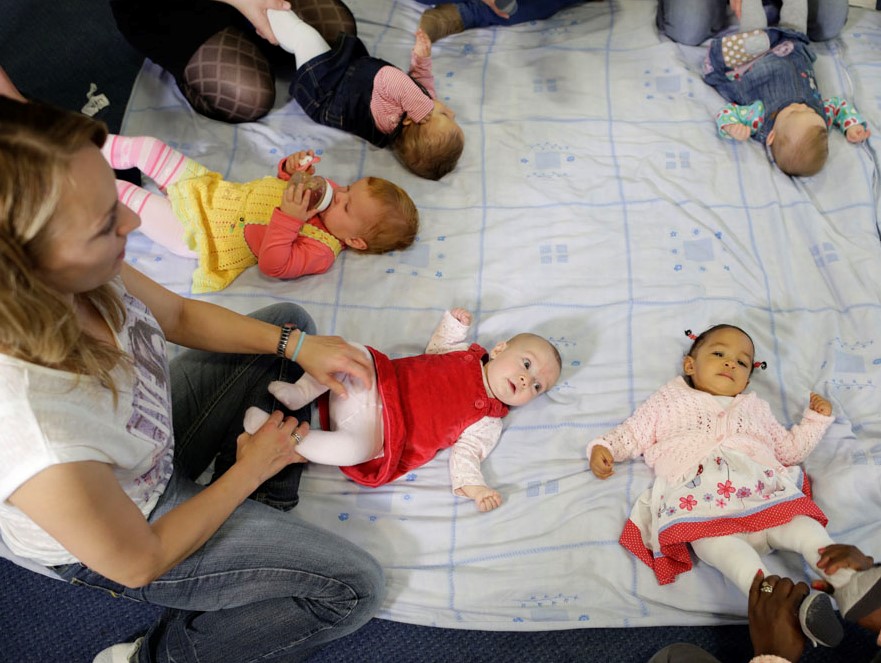
Side Quote Color:
baby & toddler club: cbeebies
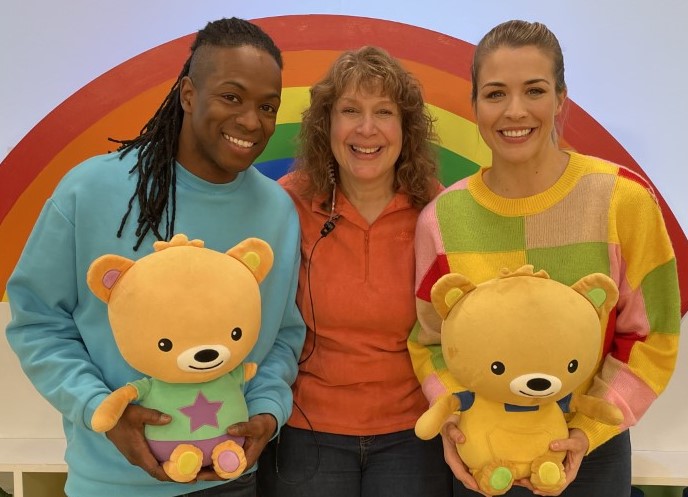
April 2022 update: CBeebies' The Toddler Club is now on our TV screens! We had great fun meeting new presenter Gemma Atkinson late last year as her Toddler Club journey began, to talk all things working with toddlers and families.
It was fantastic to be back as educational consultant for the filming in the studio, with the amazing families, presenters and production team (Peeple's Helen pictured with Gemma, Nigel Clarke, and toddler twin bears Bailee and Benjee). As Gemma put it: "This show is about showing all aspects of parenting. No judgment, lots of laughs, snot, tears and tantrums. Basically the everyday life of parenting that we all navigate in our own way."
You can see the latest 15 minutes episode every weekday during April on CBeebies, or catch up with the Toddler Club on the BBC iPlayer. It combines toddler group sessions with songs, story and activities - as well as toddlers who sometimes join in and sometimes don't, just like they do (or don't!) - and new clips from families' homes, which were so popular in 'The Toddler Club at Home' episodes during the lockdowns. (If you have a baby, you can still find The Baby Club episodes on the iPlayer too.)
We hope you enjoy it - and if it inspires you and your little one to join a baby or toddler group, you can find out more in our Parents Area.
October 2021: the team are working on the first series of The Toddler Club to be filmed in the studio, with lots of local families and lively toddlers!
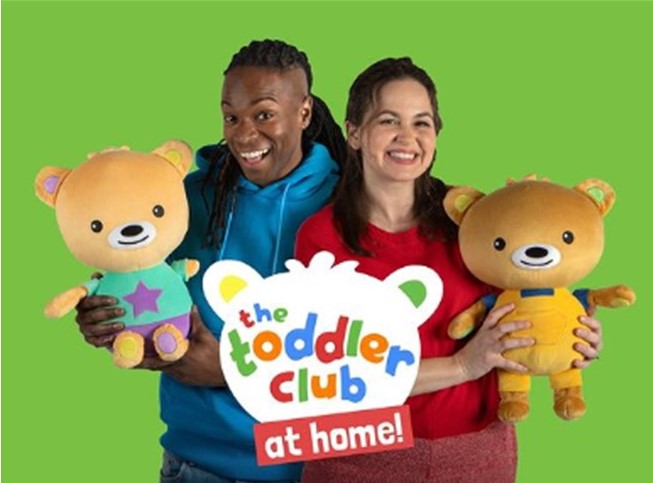
This follows the success of 'The Toddler Club at Home', filmed remotely during lockdown including lots of great clips from families. Click the links to catch the 20 episodes of The Toddler Club at Home or the first 98(!) episodes of The Baby Club on the BBC iPlayer, and lots of great Baby Club songs to join in with.
January 2021: The latest series from the team is now on CBeebies and BBC iPlayer - this time 'The Toddler Club at Home', to include slightly older children. There are 20 brand new episodes of about ten minutes each. They pack in lots of simple ideas (and clips from families at home) around a theme such as routines, opposites, colours, conversations. Rather than using a story book, Nigel or Gi tell a story and invite children and parents to join in - you don't need a book to tell a story! And there are twin baby bear characters to meet, and a catchy new toddler bop song.
June 2020: New ‘The Baby Club At Home’ episodes have started on CBeebies - offering parents and their babies (up to 18-months or so) the chance to join in with new ideas and activities, have a sing-a-long and maybe even spot yourself in the process! It's hosted by the usual presenters Giovanna Fletcher and Nigel Clarke from their own homes, along with lots of video-clips sent in by parents, of themselves and their babies playing and singing during lockdown. It's a spin-off series of the hit CBeebies ‘The Baby Club’, and we at Peeple are excited to be educational consultants again! Short 6-minutes episodes are on CBeebies at 9.25am every Saturday and Sunday, and available afterwards on the BBC iPlayer.
Feb 2020: BBC television's The Baby Club on CBeebies has been commissioned for a third series, and we're delighted to be working on it again as educational consultants. We've also been working with The Baby Club Team on a related book Play and Learn with your Baby, which has just been published by DK.
The Baby Club is CBeebies' first TV programme for parents, as well as their babies and toddlers. Presenters Nigel Clarke and Giovanna Fletcher will be back, along with Baby Bear, and lots of new ideas and activities to share.
The Baby Club is a 15-minute programme, sharing simple play ideas, songs and stories with parents and their babies, using everyday objects from around the home. It also gives a taste of what it's like, going to a parent and baby group. It's built up a loyal following with families, and we hope you enjoy it too. If you haven't seen it yet, you can catch the first two series on the BBC iPlayer.
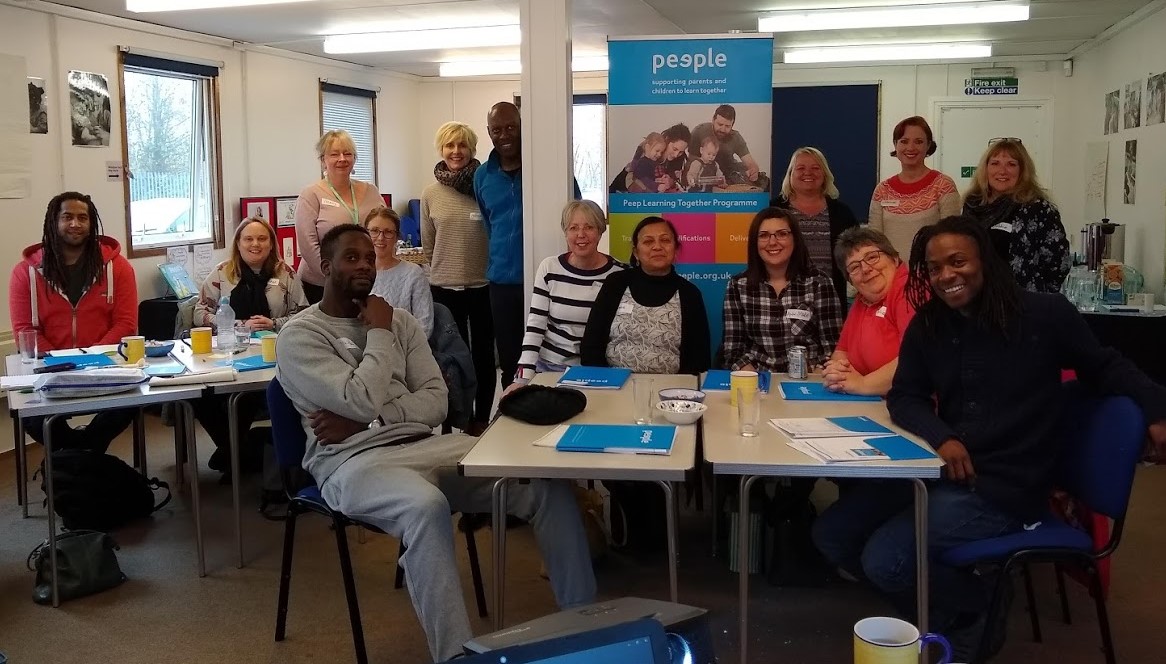
It was great fun sharing our Peep Learning Together training with Giovanna and Nigel - you can see Nigel with his fellow Peep practitioners on the course he attended here at the Peeple Centre before the first series. He's also been writing his Nigel's Baby Club Diaries blog, which is well worth a look.
Check out our social media pages where we share similar ideas for things to do at home - for babies, toddlers and pre-schoolers. And hopefully you or parents you work with will be inspired to find a local parent and baby/ toddler group, like Peep, if you haven't already!
Peep Facebook, Peep Instagram and Peep Twitter - all @PeepleCentre | TheBabyClubTV instagram | Nigel's instagram | Gemma's instagram | Foundation Years Trust Instagram | Three Arrows Media Instagram | Play and Learn with your Baby book
Feature box colour:
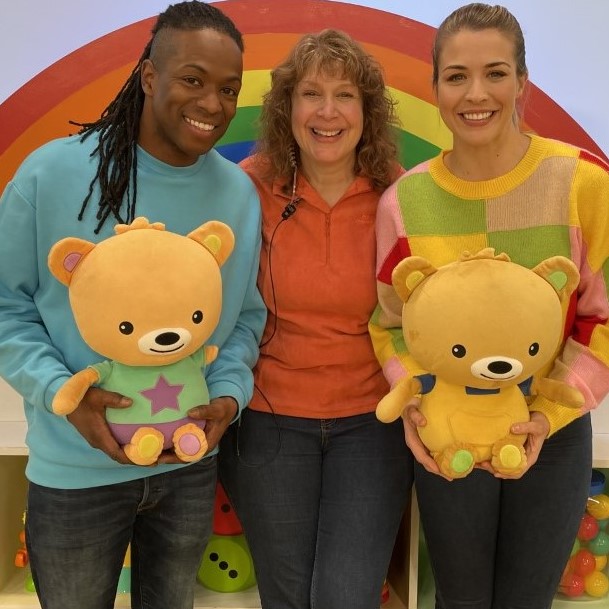
find out more or book training
tel 01865 397 970
training@peeple.org.uk
> dates & booking
> in-house training
> training courses
> sign up to our e-newsletter
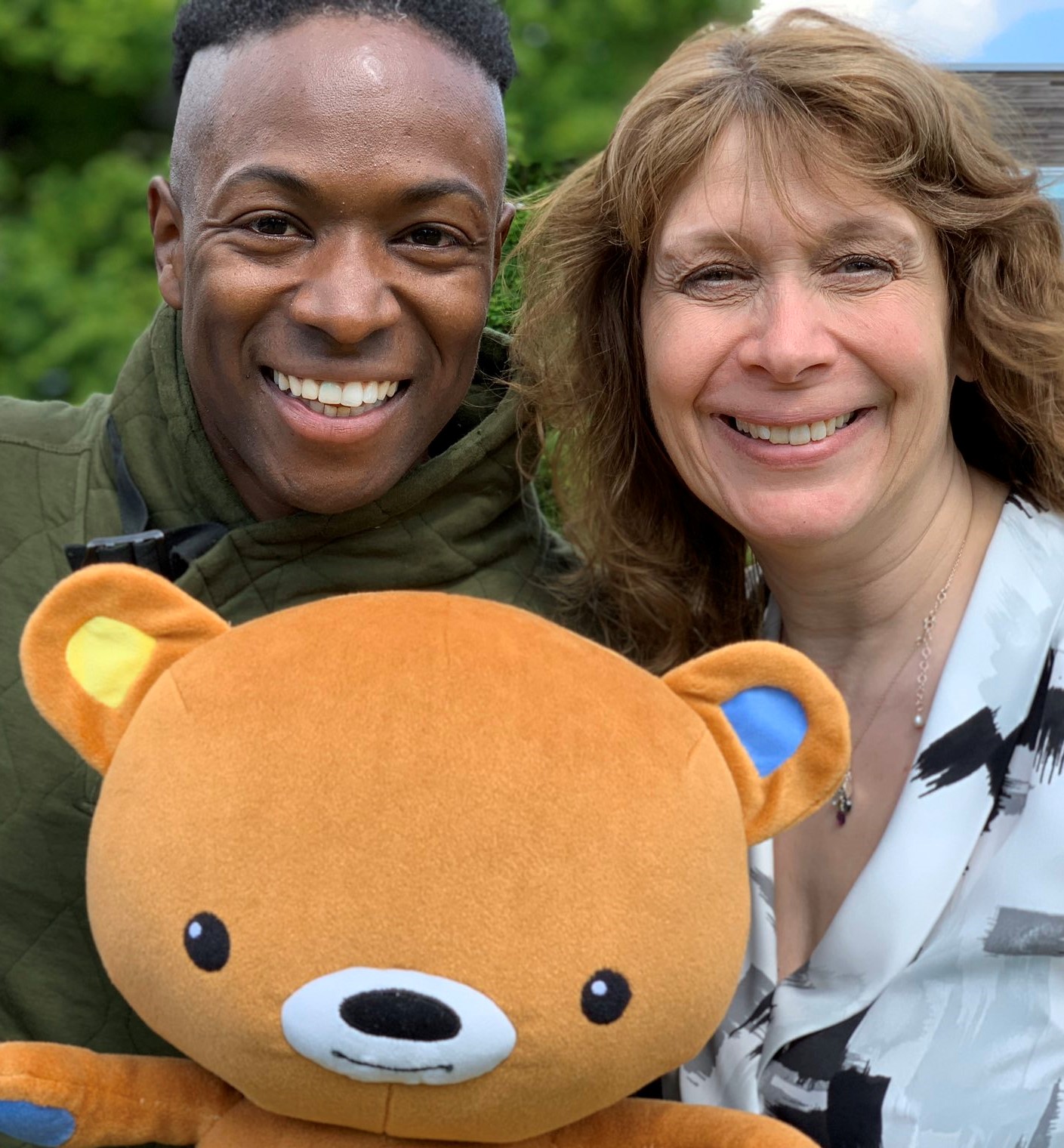
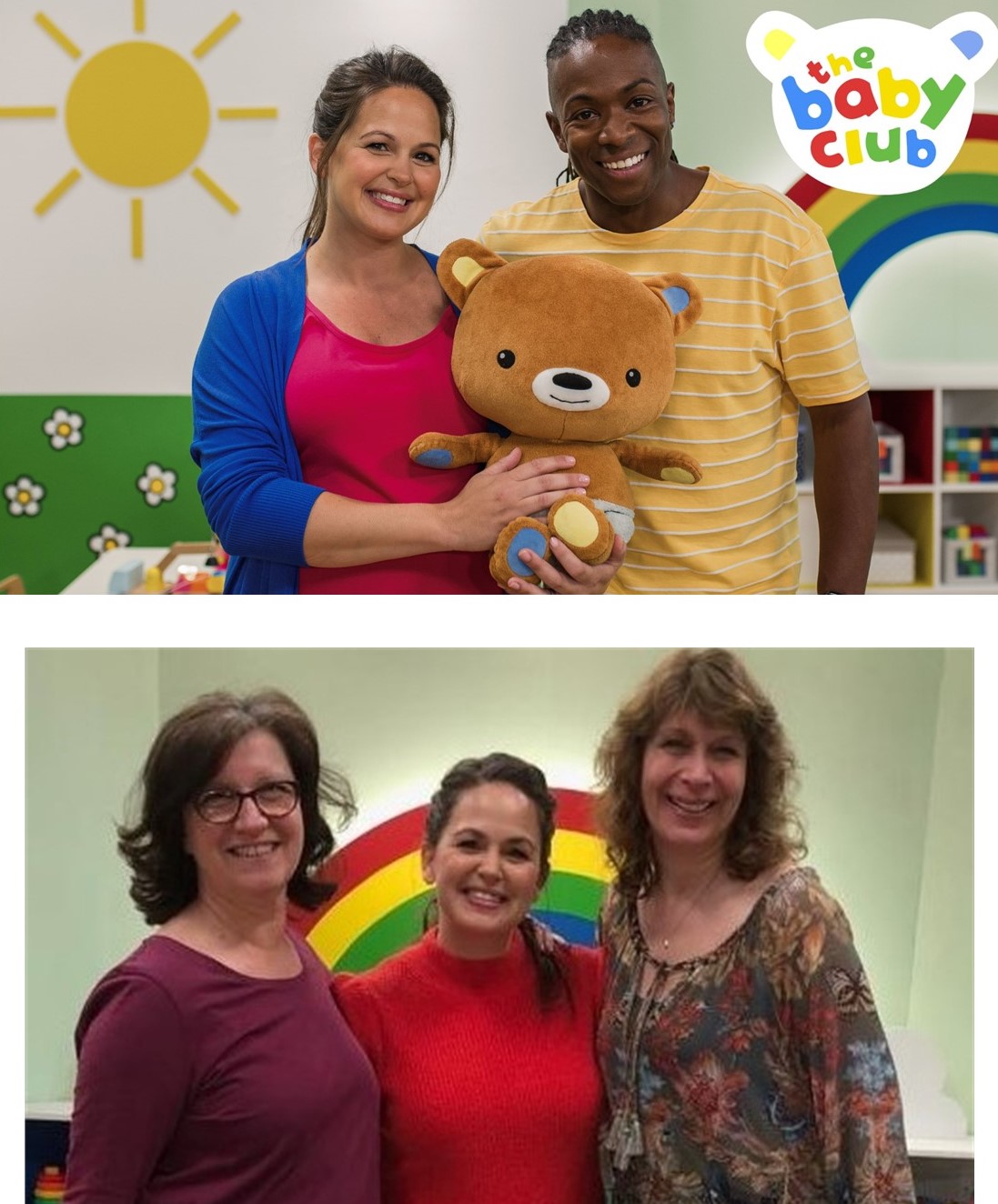
Side Quote Color:
policy links and peep
The Peep Learning Together Programme is an early intervention and prevention programme, deliverable by and across a range of disciplines. We train, support, resource and accredit practitioners to work with families to recognise how they already support their children's learning and development and gain the knowledge, skills and confidence to do more.
The web-pages in this section link to a number of the key government policies which have influenced and/or been influenced by Peeple and Peep programmes.
> Policy links and Peep: Scotland
> Policy links: England and Wales
UK-wide policies
> UK STEM Policy and the Peep Learning Together Programme (8-pg) (Jan 2019)
> UK STEM Policy and Peep LTP - Summary (2-pg + links)
STEM (Science, Technology, Engineering and Maths) is increasingly seen as important to future development. Governments across the UK have developed a number of STEM strategies and policies. The above document provides links to the policies, and outlines how the Peep Learning Together Programme supports them, from the earliest years.
'I think the Peep programme has the child and family at the centre and we work with the parent to give them the best possible experience and interactions with their child. We are encouraging, motivating and supporting families through an informal education approach. The parents have the opportunity to gain accreditation and recognition for their learning. They are modelling success with their children'. Alison Wales, Peep Coordinator, South Ayrshire
policy links and peep
Feature box colour:
find out more or book training
tel 01865 397 970
training@peeple.org.uk
> dates & booking
> in-house training
> training courses
> sign up to our e-newsletter
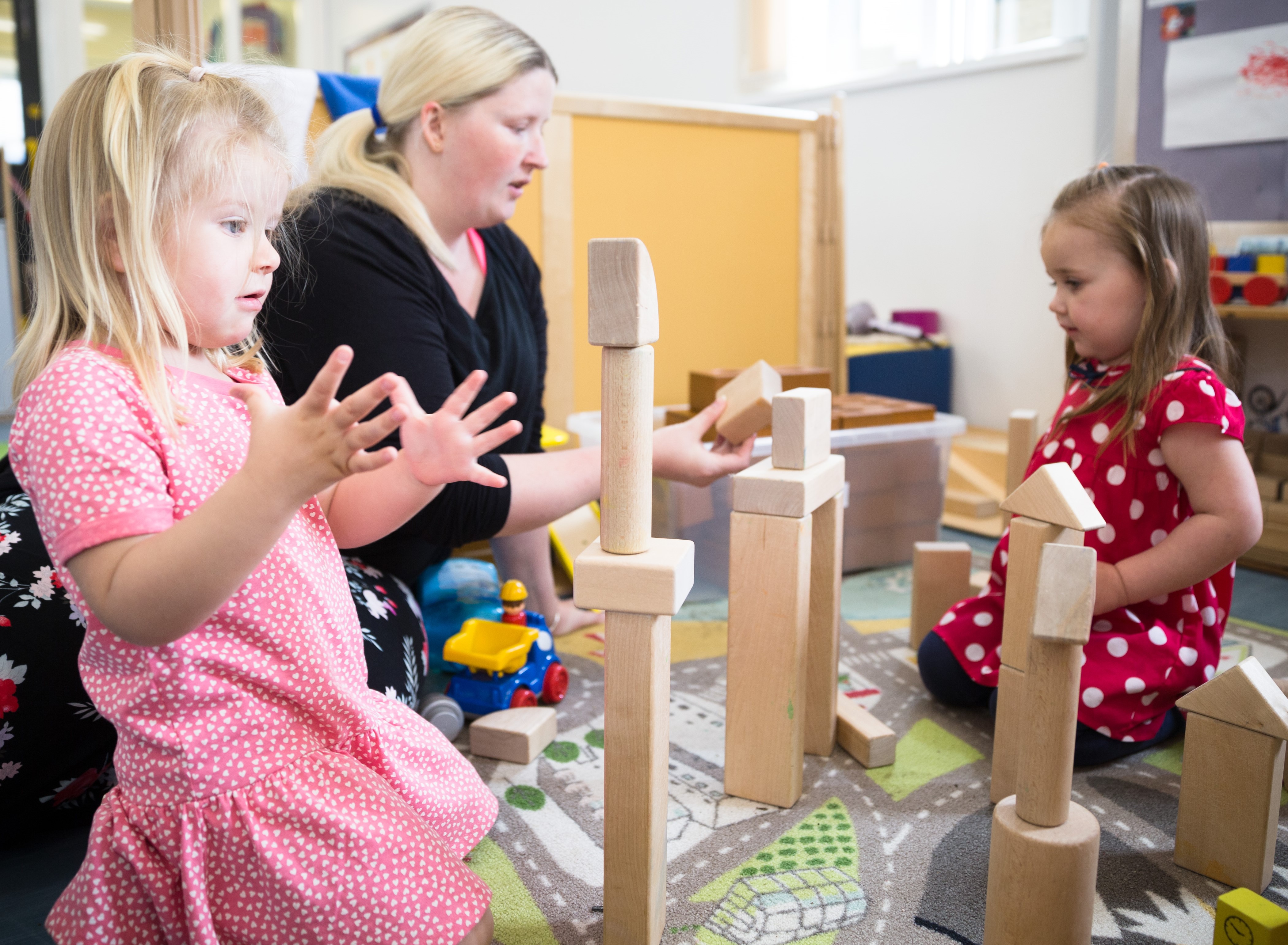
Side Quote Color:
policy links - England, Ireland and Wales
Here you can find some government policy links (and reports that have influenced government policy) that are relevant to Peeple's aims and to the parenting and early years sectors more generally.
> How Peep Programmes support early years Health work with families - demonstrates how Peep links to Public Health England's and the Dept of Health and Social Care's Six early years high impact areas for health visiting, relating to the Healthy Child Programme and MECC (make every contact count) approach (2018). The Peep approach also complements the iHV's 'Health Visiting in England: A Vision for the Future' (2019). Midwives, health visitors and community nursery nurses are often the main people, beyond close family and friends, that families have contact with during the weeks and months before and after a child's birth. The Peep Antenatal Programme and Learning Together Programme offer a simple way that they can share practical ideas with families, supporting the early development of a strong attachment relationship.
> 'Improving the home learning environment: a behaviour change approach' (Nov 2018, Department for Education)
Changing behaviour to help promote early language and literacy development through the home learning environment (HLE).
early education, learning and development:
> 'Early Years Foundation Stage (EYFS) statutory framework' (updated April 2018, Department for Education) - England and Wales - The standards that school and childcare providers must meet for the learning, development and care of children from birth to 5.
> Foundation phase framework for 3-7 year olds - Wales
> 'Foundations for quality: Review of early education and childcare qualifications' (June 2012, Professor Cathy Nutbrown)
> 'The Early Years: Foundations for life, health and learning' (March 2011, Dame Clare Tickell, Chair of the EYFS Review)
Government-commissioned Independent review into the impact of the early years foundation stage (EYFS) on children's learning and development, and early years practitioners.
> Learning to learn framework - early years education and learning - Northern Ireland
> National Quality Framework for Early Childhood education - Siolta (birth to six years) - Republic of Ireland
> Curriculum framework for early childhood - Aistear - Republic of Ireland
Review of Children and Young People's Mental Health provision:
> 'Transforming children and young people’s mental health provision: a green paper' - and the government's response to the consultation and next steps (July 2018, Department for Health and Social Care, and Department for Education)
> Peeple's response to the mental health provision green paper consultation (March 2018, Peeple)
> 'Are we listening? Review of children and young people's mental health services' (March 2018, Care and Quality Commission, the independent regulator of health and social care in England)
> 'Social mobility policies between 1997 and 2017: time for change' report (June 2017, Social Mobility Commission)
> 'Early Intervention - Briefing Paper' (June 2017, for House of Commons library)
"Early intervention is a public policy approach which encourages preventative intervention in the lives of children or their parents, to prevent problems developing later in life. Interventions can either be targeted at children deemed to be at higher risk of disadvantage, or can be universal in scope. As well as the political and social benefits of preventing poor outcomes in later life, such as mental health problems, low educational attainment and crime, advocates of early intervention also cite economic benefits to the approach. This is based on the argument that preventative policies cost less to implement than reactive policies. Due to the rapid pace of physical and social development in children’s early years, early intervention is a policy approach often targeted at very young children. This briefing paper looks at early intervention in terms of policies targeted at children from conception to age five."
> Childcare Act 2016 (March 2016, UK Parliament)
"An Act to make provision about free childcare for young children of working parents and about the publication of information about childcare and related matters by local authorities in England."
> 'Sure Start Children's Centres: guidance for local authorities' (April 2013, Department for Education)
> 'Best Practice for a Sure Start:The Way Forward for Children’s Centres' - (July 2013, Report from the All Party Parliamentary Sure Start Group)
> Building a brighter future: Early Years and Childcare Plan: Wales (2013, Welsh Government)
> 'Review of Child Protection: a child-centred system' (May 2011, Professor Eileen Munro, Dept for Education-appointed review)
> 'Early Intervention: The next steps' (Jan 2011, Government-appointed Early Intervention Review Team/ Graham Allen MP)
> 'The Foundation Years: preventing poor children becoming poor adults' (Dec 2010, Government-appointed Review on poverty and life chances/ Frank Field MP)
> 'Fair society, healthy lives: strategic review of health inequalities in England post-2010' (Jan 2010, Professor Sir Michael Marmot, Dept for Health-appointed independent review). 'The Marmot review 10 years on' is due to be published Feb 2020.
> 'Opportunity for all: Tackling poverty and social exclusion' (Sept 1999, Dept for Social Security)
Feature box colour:
Side Quote Color:
vision, mission, aims and annual report
our vision
Every family makes the most of everyday learning opportunities which improve life chances and help narrow the gap in attainment.
our mission
Peeple exists to help parents improve their children’s life chances, particularly in less affluent areas, by making the most of everyday learning opportunities at home and in the community. Our core purpose is to narrow the gap in attainment particularly by supporting parents in raising their babies and young children to reach their full potential. We do this by developing interventions which support parents as their children’s first educators, by training practitioners to work with families and by supporting the implementation of our programmes. We also deliver services directly to families and help parents to gain qualifications which lead to further education or employment. In addition, we contribute to research and policy development in early years education.
Our work is underpinned by the Peeple principles.
peeple aims 2023-24
- Train and accredit more practitioners to support families with their young children’s learning
- Provide more support for trained practitioners to implement Peep programmes
- To accredit more parents with Peep Progression Pathway units
- Support more families in Oxfordshire
- To provide high quality early learning and childcare at Little Peeple Nursery
- To develop new interventions and extend the Learning Together Programme resources
- To share evidence and good practice with the Early Years sector, policy makers and researchers
- To ensure good governance, management and infrastructure
peeple annual report
> Download our Annual Report 2022-2023
our vision, mission, aims and annual report
Feature box colour:
find out more or book training
tel 01865 397 970
training@peeple.org.uk
> programmes
> training courses
> dates & booking
> sign up to our e-newsletter
peep parent comments:
'Peep helped us bond more, we learned new songs and how to make things with everyday stuff at home'
‘I felt isolated but found Peep a lifeline’
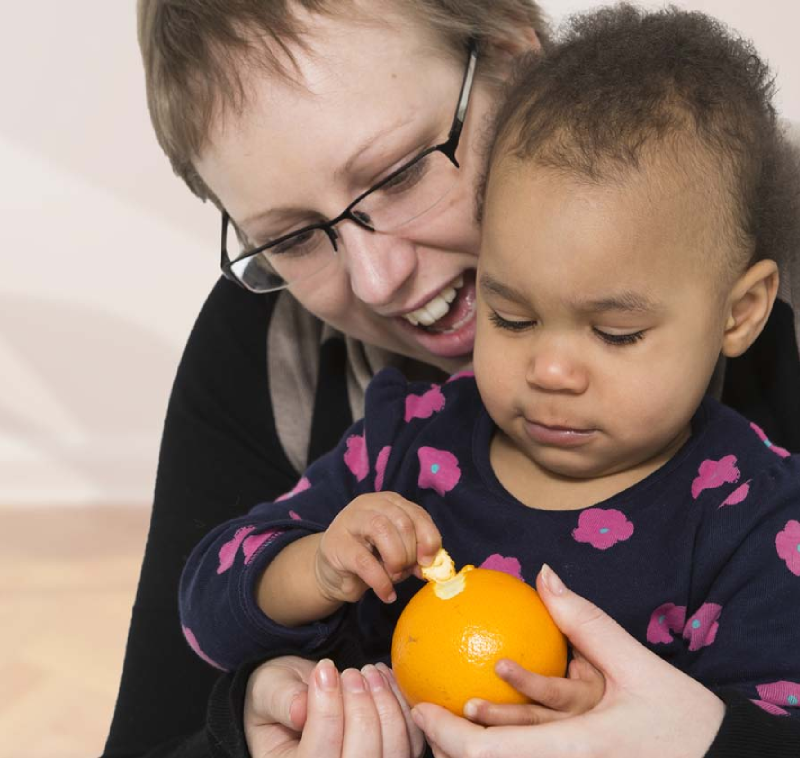
Side Quote Color:
who can deliver peep programmes and training?
Peep programmes can only be delivered by practitioners* who have attended the relevant training course: Peep Learning Together Programme Training, Peep Progression Pathway Training or Peep Antenatal Programme Training.
[ * By 'practitioner' we mean anyone who works with or supports families, whether in a paid or voluntary capacity. See below re charging for Peep.]
We ask all training delegates (i.e. Peep practitioners) to sign an agreement that they will only share the programme with families involved in the programme and/or with practitioners who have completed the current Peep Training (i.e. since Feb 2015), and that they will not train other practitioners.
This helps us to protect and maintain the quality and integrity of the Peep programmes and delivery, by ensuring that everyone using the programme/s:
- is trained to the same standard
- uses the programme materials appropriately in their delivery
- includes all of the necessary elements that make the programme effective.
who can train practitioners to use peep programmes?
Peep practitioner training can only be delivered by Peep Trainers who have been inducted and approved by Peeple - we don't have a cascade model, there are 3 ways of being trained:
- by Peep trainers who are employed or work freelance for Peeple,
- by Peep trainers who are part of a local Peep Training and Support Agreement. This is when local authorities or large organisations in the UK or Republic of Ireland want to train a large number of practitioners or to continue training them over time, so they can use Peep strategically. They may then benefit from having their own Peep trainers, who are inducted and supported by Peeple. The Agreement is renewed annually. Please contact us to discuss this further: training@peeple.org.uk.
- by Peep trainers who are part of Peeple's licence agreement with Playgroup Victoria to deliver Peep Training in Australia.
can practitioners charge families to attend peep sessions?
Peeple is a charity, and we prefer Peep Learning Together sessions to be free to families. We don’t want any families to be excluded because of cost, but we know that free, universal provision for families has had many cuts over the years.
We are sometimes asked if Peep-trained practitioners can charge families to attend, on a not-for-profit basis. We ask that you look for other sources of funding first. We understand though that you may need to put together a sensitive, voluntary charging plan, which would enable those unable to pay to still access sessions.
We have also had a few enquiries from practitioners who want to offer Peep Learning Together sessions to families on a self-employed basis (i.e. charging families). We do not currently have a licensing model (which would be in keeping with our charitable aims, ensure quality and fulfil legal requirements) but will be exploring that. For now, we recommend that you contact local organisations, to see if they will either fund you to deliver Peep sessions for them on a sessional basis (i.e. paid per session) or on a voluntary basis. This could be via your local authority (e.g. children's or family centres, libraries, schools or early years settings, etc) or a local charity (e.g. HomeStart). If this isn't possible and you'd like to informally pilot charging for sessions, then do please contact us, and we can discuss maintaining quality, being inclusive for families on lower incomes, support needs and feedback, etc.
Please let us know if you’d like us to update you on any changes in the future, and do get in touch with any questions.
Email support@peeple.org.uk or tel 01865 397970
Feature box colour:
find out more or book training
tel 01865 397 970
training@peeple.org.uk
> in-house training
> training courses
> sign up to our e-newsletter
Side Quote Color:
Little Peeple Nursery
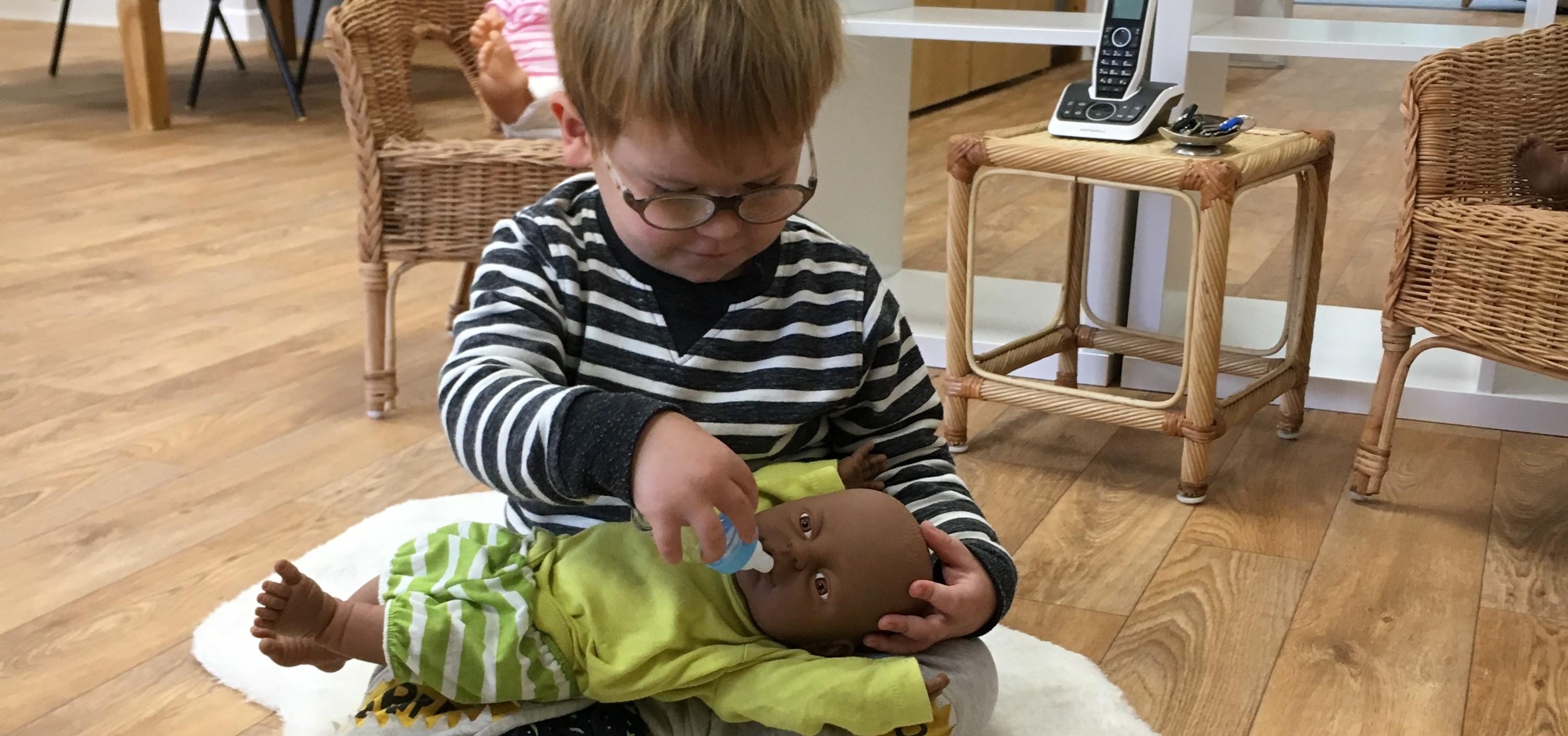
Our Little Peeple Day Nursery offers education and childcare for 48 weeks of the year. You can choose whether your child attends pre-school hours or all-day sessions. We're here to meet the needs of you and your child, whether you are returning to work or education, preparing your child for school and/or want your child to socialise, play and learn with other children.
The Peeple principles are at the heart of our approach. We are here to support children, parents and carers to learn together, by valuing and building on what families already do.
We opened our Nursery - for babies and children from six months to four years - in October 2018. It was built in partnership with The Oxford Academy and Oxfordshire County Council. In summer 2019 we merged our Peep Pre-school into our new and larger nursery building.
caring for your child
Our aim is to work in partnership with you to provide the best care and education for your child before they start school. We will ensure that your child has an enjoyable time with us and that we offer an enabling and rich environment that will meet your child’s individual needs. Our setting is secure and physically comfortable, so that the children can enjoy playing, exploring and learning. We encourage the children to explore all areas – though we recognise that children sometimes have their own favourite spaces, especially if they are feeling tired or a little unsettled. We understand that children need space where they can relax and rest, particularly if they spend more than a few hours in the setting. The outside space offers opportunities for all areas of learning and development. Suitable clothing is available so that children can choose to go out whatever the weather.
> find out about how our nursery follows the Early Years Foundation Stage (EYFS) principles and guidance.
> find out about our nursery funding, nursery hours and term-dates, and requesting a place
ofsted
We are registered with Ofsted to care for 44 children aged from 6 months - 4 years.
We had our first Ofsted inspection in October 2019 and were pleased to be rated Good in all areas. Here is the report, and a few of the inspector's comments, illustrating the strong relationships and learning through play within Little Peeple Nursery:
'The manager and staff create a positive and purposeful learning environment. There are warm bonds between children and staff. For example, children who are a little upset at the beginning of the day are comforted by the cuddles and reassuring words from their key person. Soon these children are full of smiles and playing happily.'
'Staff ensure that children have lots of fun while also learning and developing new skills.'
'Staff make consistently good use of opportunities to engage in conversations with children. They speak clearly, introduce new words and listen to what children say. Children have many opportunities each day to listen to stories and join in with songs. These experiences are very popular with all children.'
Feature box colour:
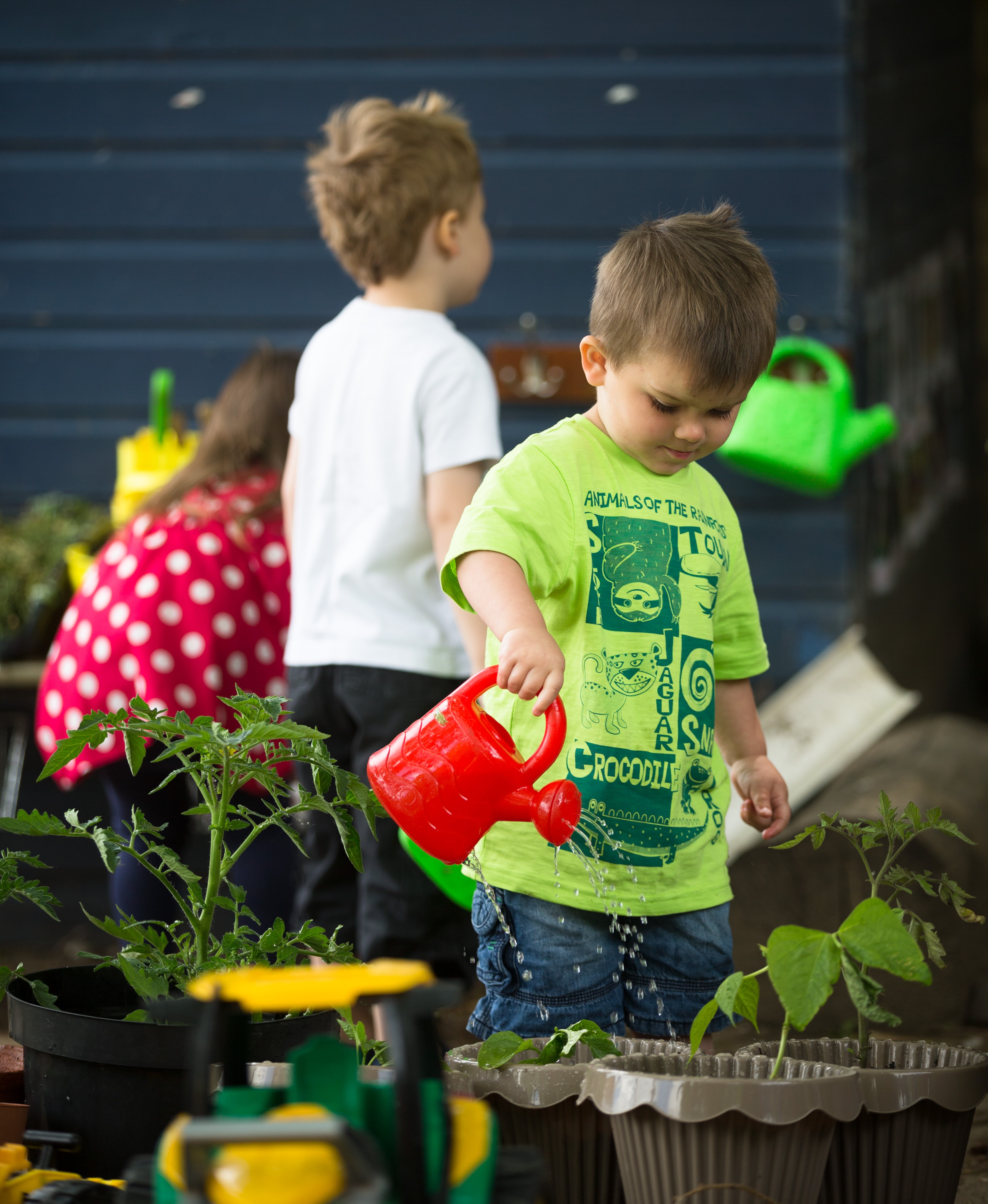
contact us
Get in touch with any questions, to arrange a visit or to find out about booking a place at Little Peeple Nursery.
Email:
littlepeeplenursery@peeple.org.uk
Address (for sat nav):
Little Peeple Nursery
The Oxford Academy
Northfield Close entrance
Littlemore, Oxford
OX4 4NH
Tel: 01865 397972
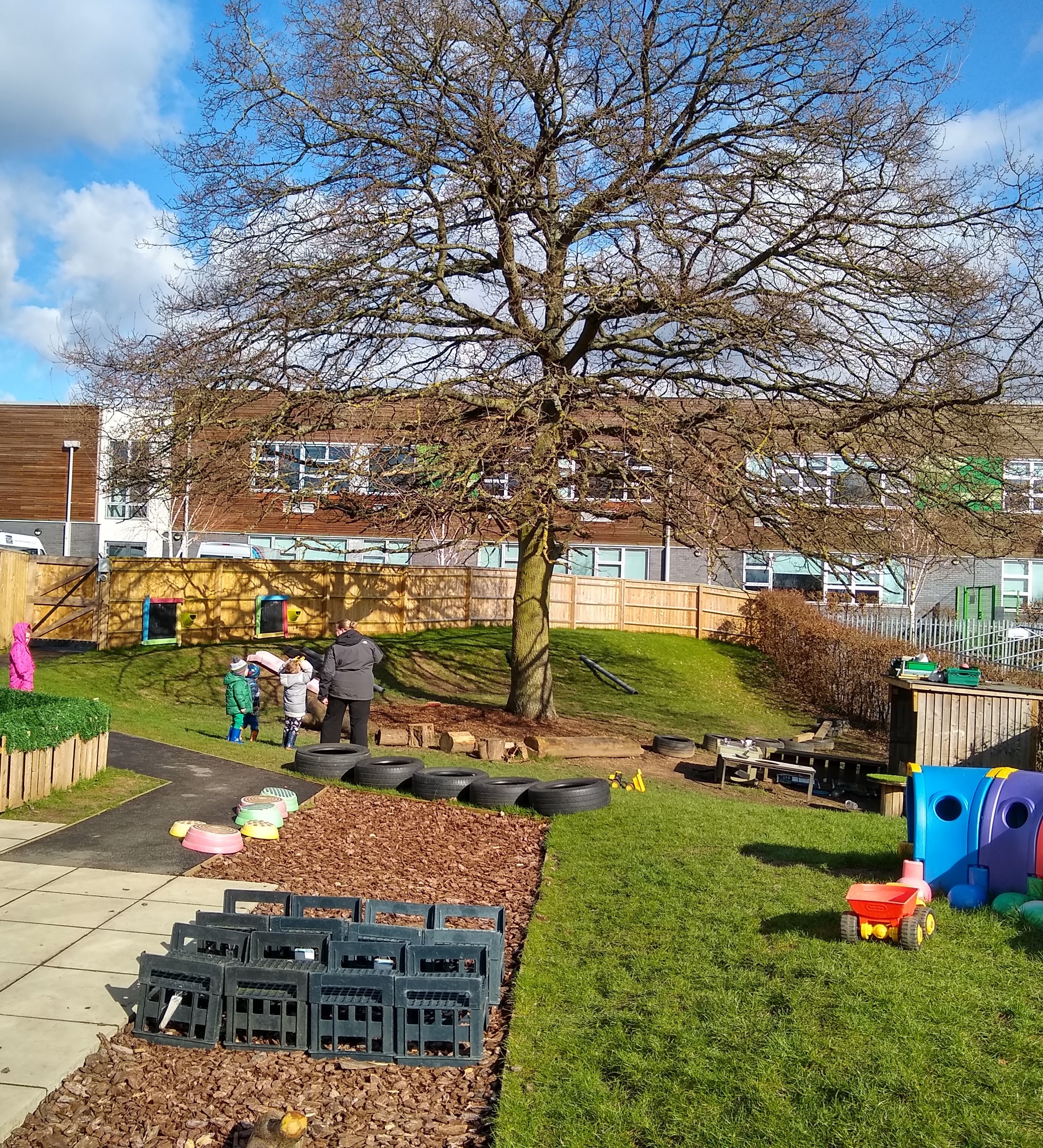
Side Quote Color:
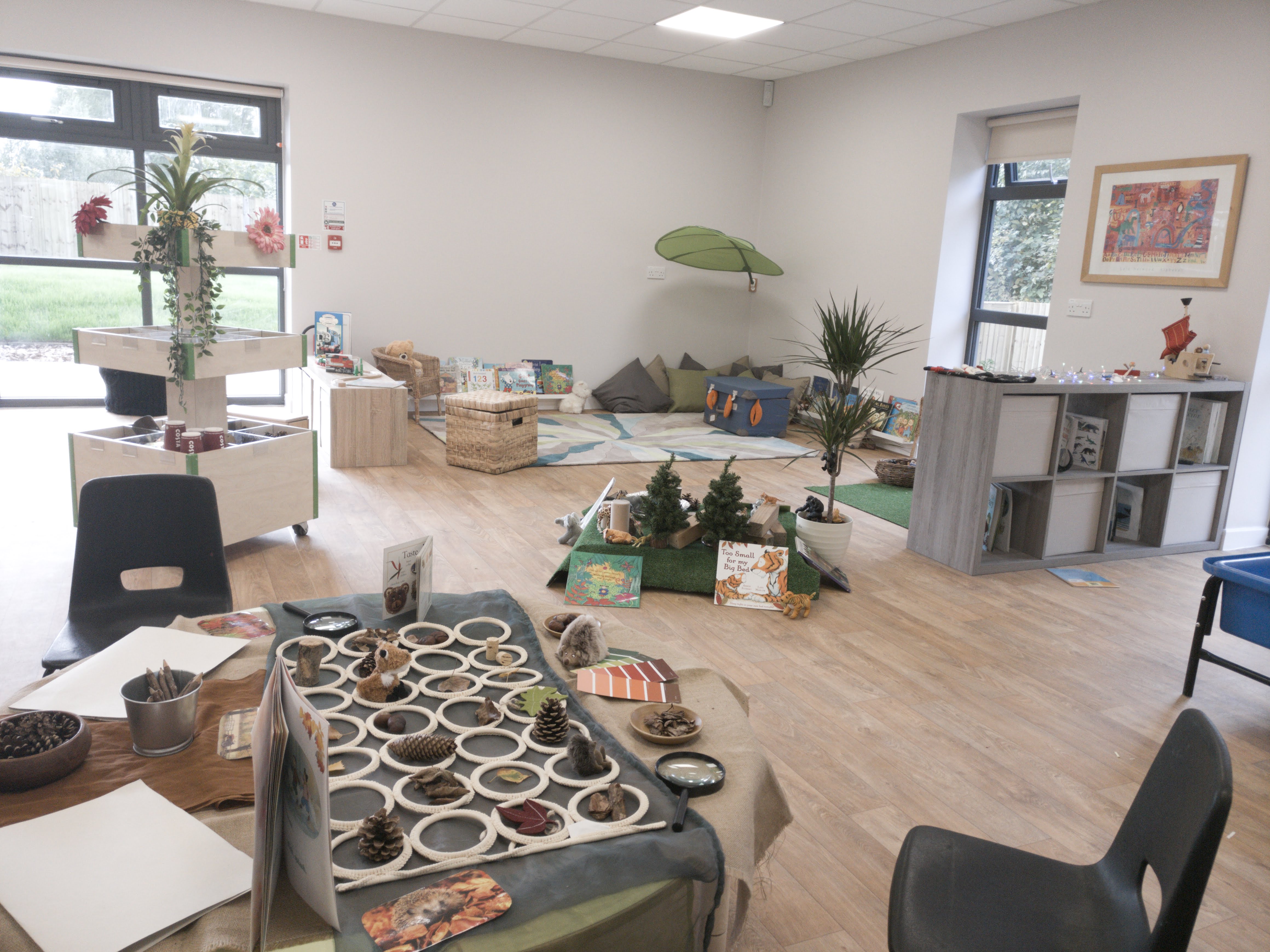
jobs
We don't currently have any vacancies.
If you are interested in hearing about jobs at Peeple in the future or in volunteering for us please fill in our Expression of interest form and email it to jobs@peeple.org.uk
There may be permanent, temporary or supply cover job vacancies in our Little Peeple Nursery in Littlemore, Oxford over the coming months. Please look out for further notices on this website or our social media pages. If you have a strong interest and commitment to looking after the needs of babies to four year olds and involving parents in their child’s learning, please contact Lindsey Hart, our Early Education and Childcare Manager, to find out more about work and volunteering opportunities: littlepeeplenursery@peeple.org.uk or tel 01865 397972.
jobs
Feature box colour:
Our commitment to Equal Opportunities
We’re an equal opportunities employer and welcome applications from all suitably qualified persons regardless of their race, sex, disability, religion/belief, sexual orientation, gender identity or age. We are keen to hear from applicants with a wide range of relevant backgrounds and experiences. Don’t be put off applying because you’re not sure if you’re a perfect fit for the role, or because you have caring responsibilities, etc – we do our best to be a flexible and supportive employer, in line with our charitable aims and principles.
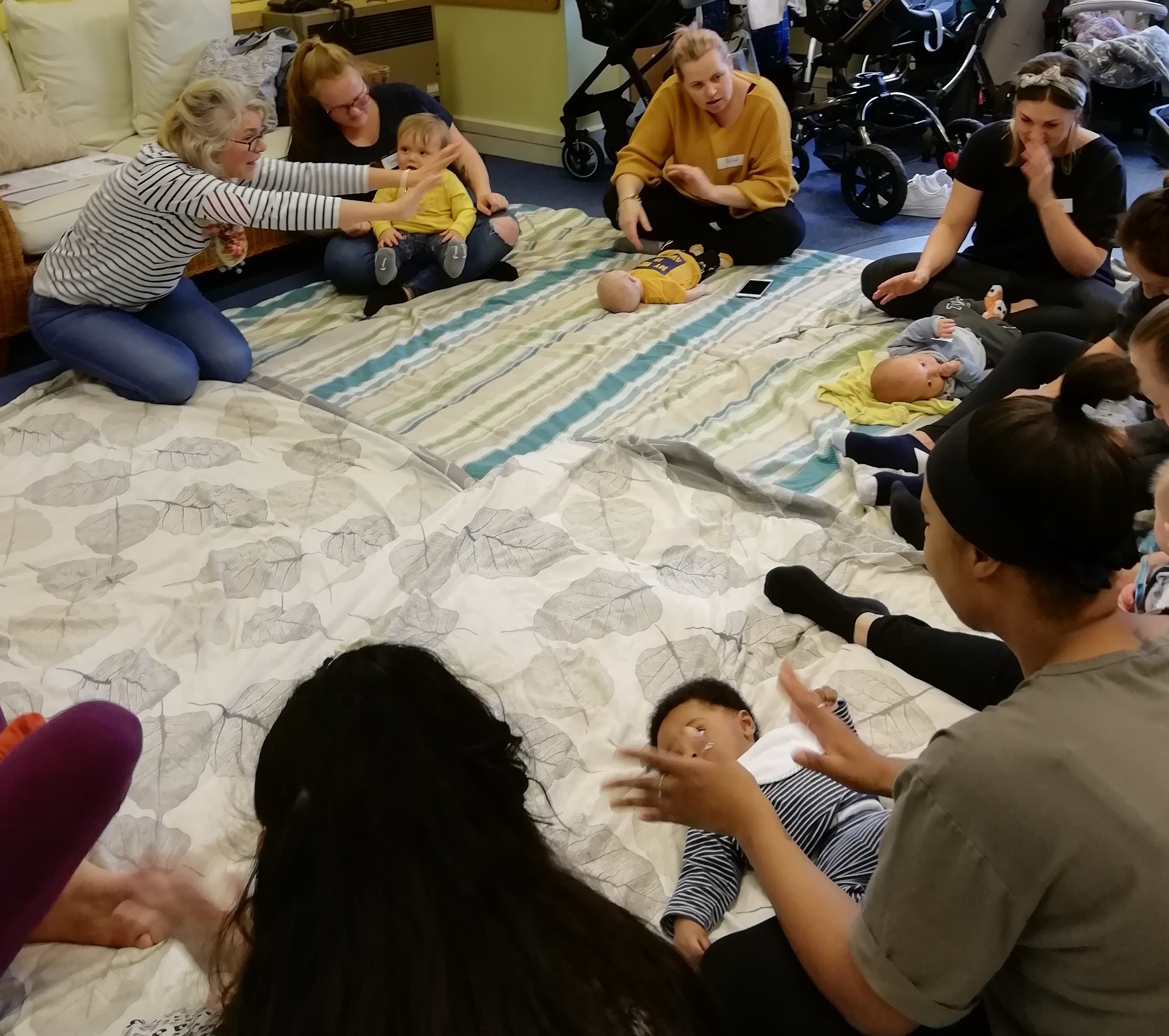
Side Quote Color:
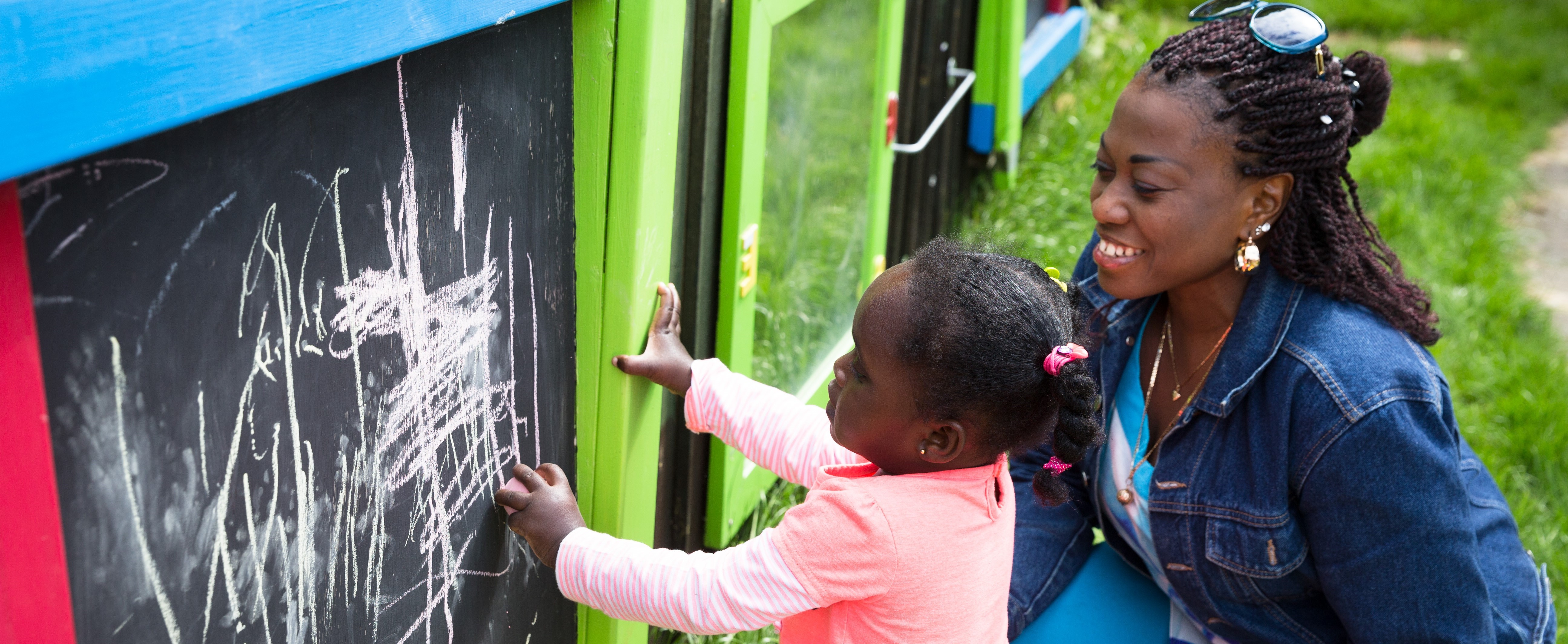
employability case studies
Peep parents often comment on how much confidence they have gained in supporting their child's learning. Attending Peep acts as a stepping stone into other learning and employment opportunities for some parents/carers. This might be a Peep Progression Pathway course and accreditation, a guaranteed interview for a college place via one of our college agreements, or the kickstart and self-belief to get the kind of job they wanted. Some secondary or high schools are also collaborating with Peep practitioners, to provide opportunities for pupils interested in a career in childcare or early education to get some first hand experience. Find out more below:
> Parent to classroom assistant in Dumfries & Galloway - "I absolutely love my job and wish that I had made the move sooner but without going to the Peep group I would never have been confident enough to do it!"
> Family Learning & employability in Derby - using the Peep Progression Pathway: certificate in 'Supporting early learning at home'
> Peep Progression Pathway parent accreditation with Home-Start Edinburgh West and South West - building confidence and opening doors
> Peep in high schools in Moray - developing the young workforce, health and home school link workers, families and pupils
> Childcare students - one-off secondary school session in Lancashire
Feature box colour:
Side Quote Color:
health case studies
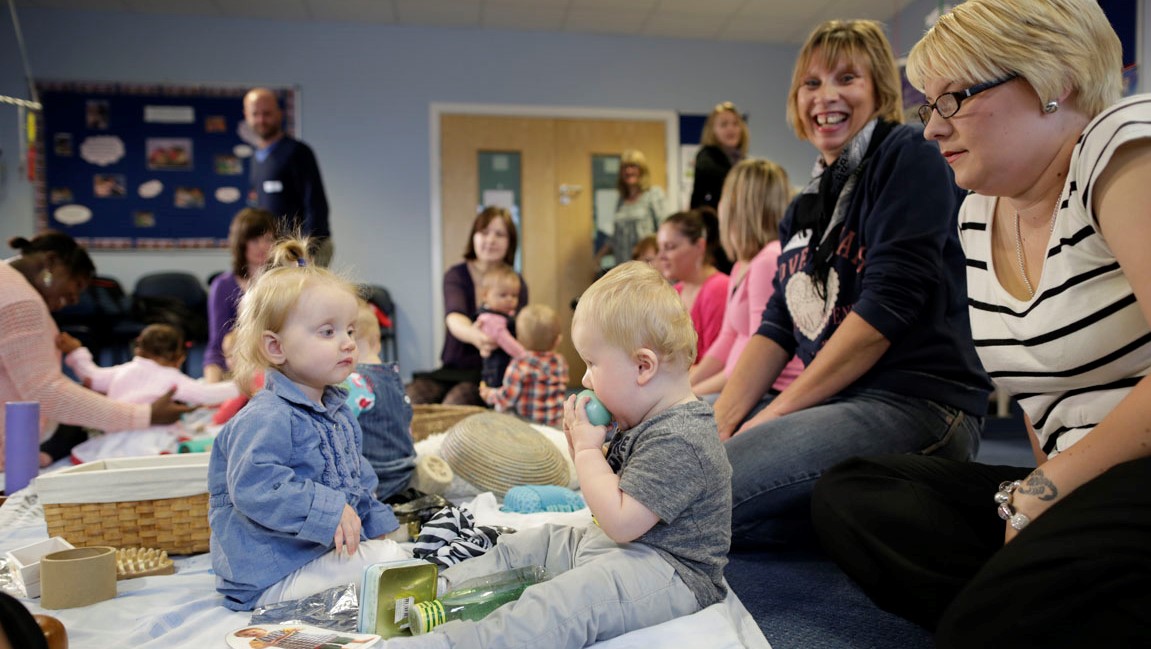 Health and well-being of families is at the heart of Peep in various ways:
Health and well-being of families is at the heart of Peep in various ways:
- The most frequent thing that parents/carers say they like about Peep is the supportive relationships that they develop, with other families and with practitioners. They find it reassuring to have a safe space in which to discuss the challenges (as well as the joys!) of raising babies and young children, without feeling judged. This is incredibly important for people's mental health, at what can be an isolating or difficult time.
- Midwives, health visitors and community nursery nurses are often the main people, beyond close family and friends, that families have contact with during the weeks and months before and after a child's birth. The Peep Antenatal Programme and Learning Together Programme offer a simple way that they can share practical ideas with families, supporting the early development of a strong attachment relationship. This document demonstrates How Peep Learning Together supports early year Health work with families, including contributing to the six high impact areas and MECC (make every contact count) approach used by health visitors and Public Health England.
- 'Health and physical development' is one of the Learning Together Programme's five strands of development. It includes 14 topics, ranging from 'Building a brain' and 'Food for life' to 'Exploring nature', 'Babies on the move' and 'Developing balance and co-ordination'. Find out more on our 'topic examples' page.
Here are a few examples of how Peep programmes are being delivered in various health contexts:
> Preparing and sharing mealtimes in nursery and home in Highland
> Peep in child health clinics in Oxfordshire
> Making the most of health centres in Moray
> Healthy Peep in Midlothian - focusing on healthy eating, hygiene, exercise, co-ordination and friendships
> Antenatal Peep online in Highland
> Water Peep in Newcastle - babies and parents in the swimming pool
> Multi-agency Peep: health and community learning in Edinburgh - pregnancy to babyhood: with midwives and health visitors, CLD and voluntary sector workers
> Peep in high schools in Moray - health and home school link workers, families and pupils (developing the young workforce)
including antenatal peep
